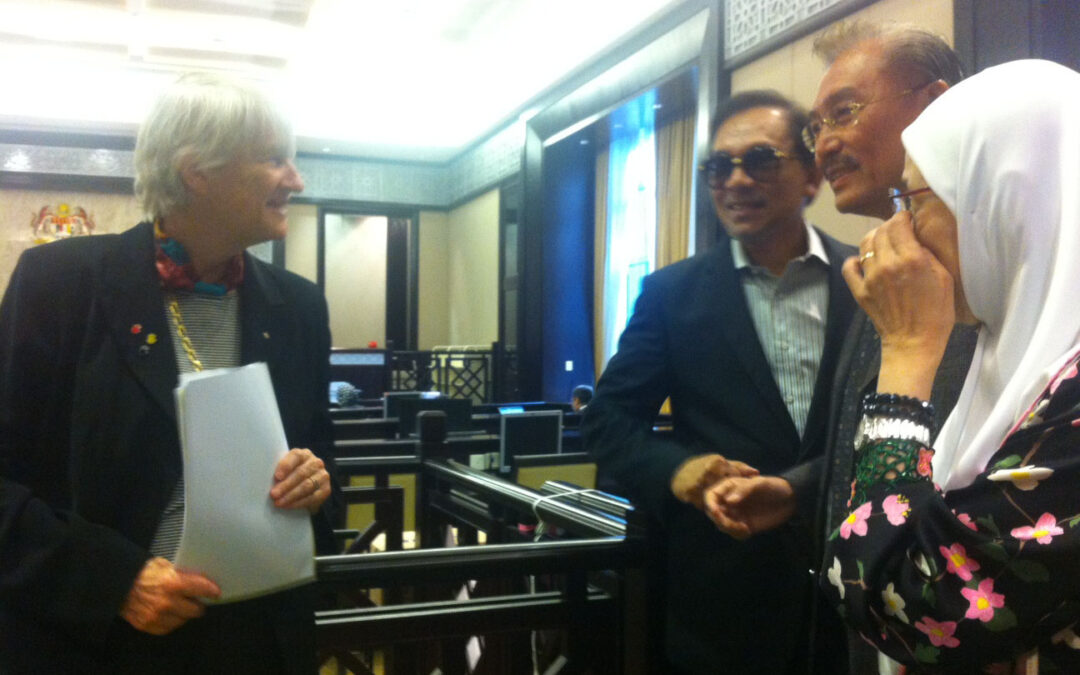
Sep 19, 2013 | News
The ongoing involvement of the lead prosecutor in the hearing on the appeal against the acquittal of opposition leader, Anwar Ibrahim, raises concerns about prosecutorial impartiality, the ICJ said today.
The ICJ is particularly concerned at the failure of the lead prosecutor, Datuk Seri Muhammad Shafee Abdullah, who was said to have some prior knowledge of the facts of the case, to remove himself from involvement in the proceedings and so maintain an appearance of prosecutorial integrity and impartiality.
“This case is a significant test of the integrity of the judicial system in Malaysia, which for so long has been the subject of concern to human rights proponents, bodies and organizations,” said Justice Elizabeth Evatt, a Commissioner of the ICJ who was observing the proceedings.
The hearing on the appeal was postponed to allow the preliminary objection raised on the first day, 17 September, by the lawyers of Anwar Ibrahim against Judge Tengku Maimun Tuan Mat’s selection as a member of the three-person panel to hear the appeal.
The defense lawyers argued that there was a perception of bias due to Judge Tengku Maimun Tuan Mat’s former ruling in a libel suit involving Anwar Ibrahim and the then Prime Minister Mahathir Mohamad in 2007.
Judge Tengku Maimum Tuan Mat thereafter recused herself from the proceedings.
The Court of Appeal therefore reconvened on the second day, 18 September, with a new judge, Dato’ Rohana Binti Yusuf, to hear the motion objecting to the appointment of Datuk Seri Muhammad Shafee Abdullah as lead prosecutor in the case.
The motion was based partly on the fact that that Datuk Seri Muhammad Shafee Abdullah was present at Deputy Prime Minister Najib’s home at the same time as the complainant two days before the incidents leading to the filing of charges against Anwar Ibrahim.
At the very beginning of the case, Datuk Seri Muhammad Shafee Abdullah filed an affidavit concerning this fact, although he was not called as a witness in the proceedings.
The Court later denied the motion objecting to his appointment as lead prosecutor in this appeal, saying that there was no conflict of interest or apparent unfairness.
Justice Evatt, however, expressed concern that Datuk Seri Muhammad Shafee Abdullah had taken on the role of lead prosecutor in the appeal.
“We expect higher standards of prosecutorial conduct,” she said. “Considering the political overtones in this case, Datuk Seri Muhammad Shafee Abdullah should be especially sensitive to any appearance that might lead to a perception of bias and partiality that might arise from his earlier knowledge of facts of the case.”
The UN Guidelines on the Role of Prosecutors provide that in the performance of their duties, prosecutors shall carry out their duties with impartiality.
The ICJ also acknowledged Judge Tengku Maimun Tuan Mat’s recusal as a sign that the Court of Appeal recognized the need to appear impartial. Under the UN Basic Principles on the Independence of the Judiciary, “judges shall always conduct themselves in a manner as to preserve the dignity of their office and the impartiality and independence of the judiciary.”
The Bangalore Principles of Judicial Conduct, state that to ensure such impartiality “a judge shall disqualify himself or herself from participating in any proceedings in which it may appear to a reasonable observer that the judge is unable to decide the matter impartially.”
The Court did not indicate new dates on when the hearing on the appeal would take place. The ICJ will continue to monitor this case.
The ICJ has previously condemned Malaysia’s continuing use of colonial-era criminal charges of ‘sodomy’ to cover even consensual sexual relations between adults.
The ICJ believes that Article 377B of the Malaysian Penal Code is inconsistent with respect for the right to privacy under international standards.
Justice Evatt, the first female judge to be appointed to an Australian Federal Court, a former member of the United Nations Human Rights Committee, and a commissioner of the ICJ, traveled to Malaysia to observe the appeal hearing from 17 to 18 September 2013, at the Court of Appeal in Putrajaya.
Contact:
Emerlynne Gil, International Legal Adviser, t +662 6198477 ext. 206 ; email: emerlynne.gil(a)icj.org
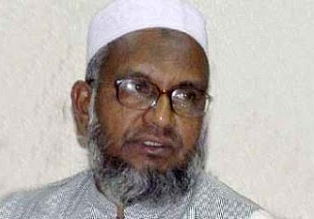
Sep 17, 2013 | News
The ICJ said that the death sentence handed down today by Bangladesh’s Supreme Court against Abdul Quader Mollah is incompatible with international principles of fair trial.
If carried out, the sentence would violate his right to life and freedom from cruel, inhuman, or degrading punishment.
On 17 September 2013, the Appellate Division of the Supreme Court of Bangladesh upheld the prosecution’s appeal to impose the death sentence on Abdul Quader Mollah (photo), the assistant Secretary-General of Jamaat-I-Islami.
Abdul Quader Mollah had received a life sentence on February 5, when the International Crimes Tribunal (ICT) convicted him on five counts, including murder and rape.
“The prosecution’s appeal to impose the death sentence on Abdul Quader Mollah was based on a law that was not in force when he was first convicted, and applying that law retroactively, especially for the death penalty, violates international law,” said Sam Zarifi, ICJ’s Asia-Pacific Director.
On 17 February 2013, Parliament passed an amendment to the International Criminal (Tribunals) Act 1973 to enable prosecutors to appeal a life sentence and seek the death penalty.
Before this amendment, the prosecution was only allowed to appeal if the accused was acquitted.
The ICJ says the retrospective application of the amendment in Abdul Quader Mollah’s case is incompatible with Bangladesh’s obligations under the International Covenant on Civil and Political Rights (ICCPR), including Article 15, which prohibits the imposition of a heavier penalty than provided for at the time the criminal offence was committed.
“Judgments such as these highlight the serious problems with the war crimes tribunal that undermine its legitimacy,” Zarifi further said. “The wounds of war can only be healed through a fair and transparent trial process that meets international standards of fair trial and due process of law.”
“It is essential that those responsible for committing atrocities during the Bangladeshi war of liberation are prosecuted and brought to justice,” Zarifi added. “But the death penalty perpetuates the cycle of violence and is a perversion of justice, and all the more so when it is imposed in violation of due process.”
The ICJ considers the death penalty in all cases to constitute a violation of the right to life and the right not to be subjected to cruel, inhuman or degrading punishment.
The ICJ calls on Bangladesh to join the great majority of States around the world in rejecting the use of the death penalty.
To that end, Bangladesh should impose a moratorium on the practice and take steps towards its abolition, as prescribed by repeated United Nations General Assembly Resolutions.
Contacts:
Sam Zarifi, ICJ Asia-Pacific Regional Director, (Bangkok), t:+66 807819002; email: sam.zarifi(at)icj.org
Sheila Varadan, ICJ Legal Advisor, South Asia Programme (Bangkok), t: +66 857200723; email: sheila.varadan(a)icj.org
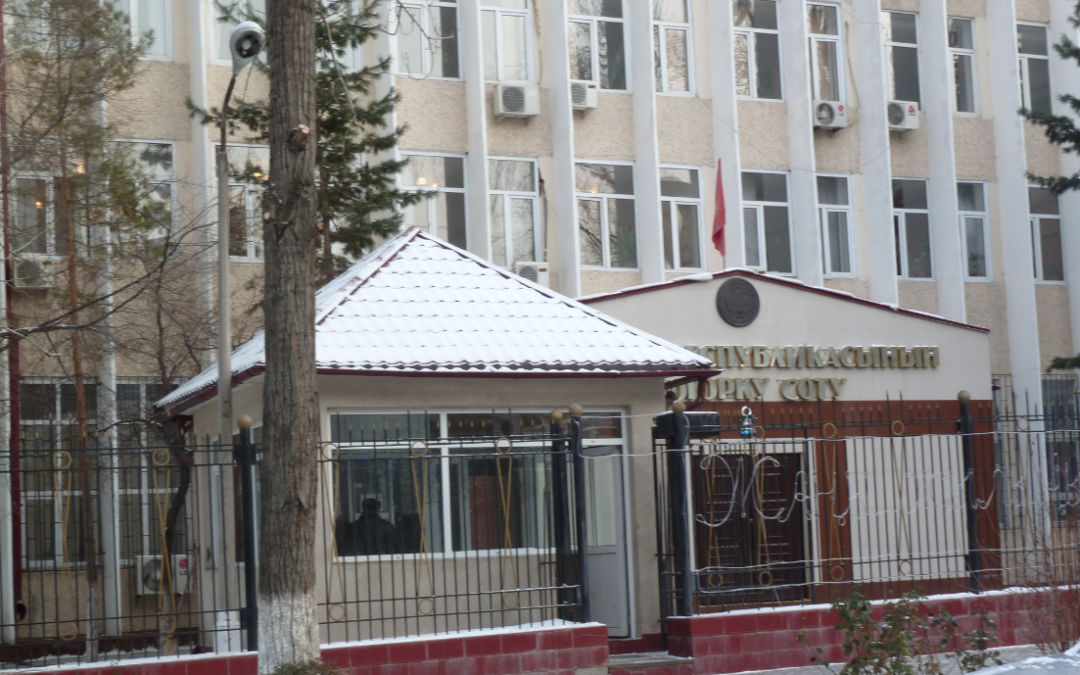
Sep 13, 2013 | News
The ICJ welcomes the decision of the Osh Regional Court to overturn an intermediate ruling to initiate disciplinary proceedings against two lawyers representing the interests of a victim of sexual assault.
The ICJ sent a mission to observe today’s hearing. The mission raised no issues of concern regarding the conduct of the proceedings observed.
On 3 July 2013, the Osh City Court issued an intermediate ruling to initiate disciplinary proceedings against two lawyers, Valerian Vakhitov, Khusanbai Saliyev, for taking procedural steps provided for under Kyrgyzstan law, including filing motions to the upper judicial instances or filing motions to recuse the judge during and not before the trial.
Today, the Osh Regional Court upheld lawyers’ appeal and overturned the decision to initiate disciplinary proceedings against the lawyers.
The case concerns charges against a teacher in a religious institution for sexual acts with one of his students, a nine-year-old boy.
The representatives of the defendant alleged that he is not criminally responsible by reason of insanity – a proposition contested by the lawyers of the victim. The main trial is ongoing.
The trial was observed by an ICJ trial observation mission: Oleg Levytskyy (Ukraine) and Almaza Osmanova (Kyrgyz Republic).
The observers met with the court, the prosecutor, representatives of the victims and the defendant.
“We welcome the decision to overturn the ruling to initiate disciplinary proceedings against these lawyers,” said Róisín Pillay, Director of the ICJ Europe Regional Programme. “In accordance with international standards, it is the lawyers’ duty to assist their clients in every appropriate way and take legal action to protect their interests. Therefore punishing lawyers for their diligent work would run contrary to the obligation of the state to guarantee that lawyers can carry out their functions without intimidation, hindrance, harassment or improper interference.”
Contacts
Róisín Pillay, Director, ICJ Europe Programme, roisin.pillay(a)icj.org
Temur Shakirov, Legal Adviser, ICJ Europe Programme, temur.shakirov(a)icj.org
Kyrgyzstan-Osh_Lawyers_Trial Observation-news-web story-2013-rus (full text in pdf)
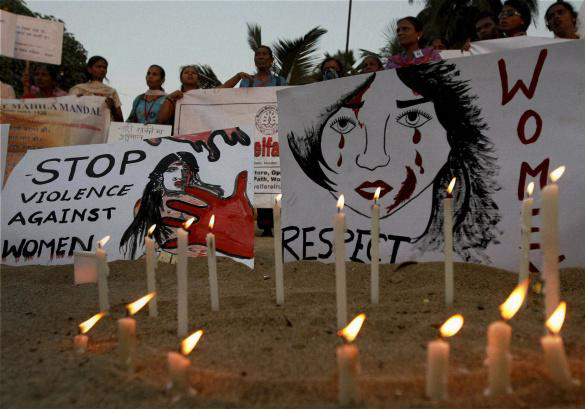
Sep 13, 2013 | News
The ICJ denounced the death sentences handed down in the Delhi gang rape and murder case and urged the Indian Government to take steps to abolish the death penalty in law and practice.
A special fast-track court today sentenced to death four men convicted for the gang rape and murder of a 23-year-old student on 16 December 2012.
The fifth accused, who was a minor at the time he committed the crime, was convicted and sentenced to three years in a reform home by a juvenile court on 31 August 2013.
“Women’s rights groups in India have taken a firm stance against the death penalty and strongly believe that the death penalty is counterproductive in every way to preventing and curtailing sexual violence against women,” said Vrinda Grover, leading human rights lawyer and ICJ’s South Asia advocate.
The ICJ considers the death penalty to constitute a violation of the right to life and the right not to be subjected to cruel, inhuman or degrading punishment.
“Those who commit acts of violence against women must be prosecuted and brought to justice,” said Sheila Varadan, ICJ’s South Asia Legal Advisor. “But the sentence and the administration of the death penalty constitutes a perversion of justice.”
“Instead of giving in to the vengeful demand for killing the perpetrators of this horrific crime, the Indian Government must take concrete steps to prevent, investigate and punish acts of violence against women,” Varadan added.
A high level commission constituted to reform Indian law on violence against women, led by the late Chief Justice of the Indian Supreme Court Justice J.S. Verma, recommended that the death penalty should not be used in rape cases.
“In demanding and securing the death penalty, Indian authorities have created a spectacle that distracts from their responsibility for systemic change in the legal system which alone will create deterrence in law,” said Vrinda Grover.
The ICJ calls on India to join the great majority of States around the world in rejecting the use of the death penalty.
To that end, India should impose a moratorium on the practice and take steps towards its abolition, as prescribed by repeated United Nations General Assembly Resolutions, the ICJ says.
Contacts:
Sheila Varadan (Bangkok), ICJ South Asia Legal Advisor, t: +66 857 200 723 (mobile); email: sheila.varadan(a)icj.org
Ben Schonveld (Kathmandu), ICJ South Asia Director, t: +977 980 459 6661 (mobile); email: ben.schonveld(a)icj.org
Additional Information
The United Nations has adopted various instruments in support of the call for the worldwide abolition of the death penalty. In 2007, the UN General Assembly adopted a resolution emphasizing that ‘that the use of the death penalty undermines human dignity’ and calling for the establishment of a moratorium on the use of the death penalty ‘with a view to abolishing the death penalty.’ The resolution was reaffirmed in 2008, 2010, and most recently in December 2012, when a large majority of UN Member States voted in favor of a worldwide moratorium on executions as a step towards the death penalty’s abolition.
Currently, 150 countries worldwide, including 30 states in Asia and the Pacific region, have abolished the death penalty in law or in practice.
Rape and other forms of sexual violence against women are pervasive in India. According to the National Crime Records Bureau, 24,923 rape cases were registered in India in 2012. Experts believe that the actual number is much higher, as rape is vastly under-reported. In most cases, however, victims and survivors get no justice from a criminal justice system that has been widely characterized as gender-insensitive, under-resourced and corrupt.
Photo: PTI
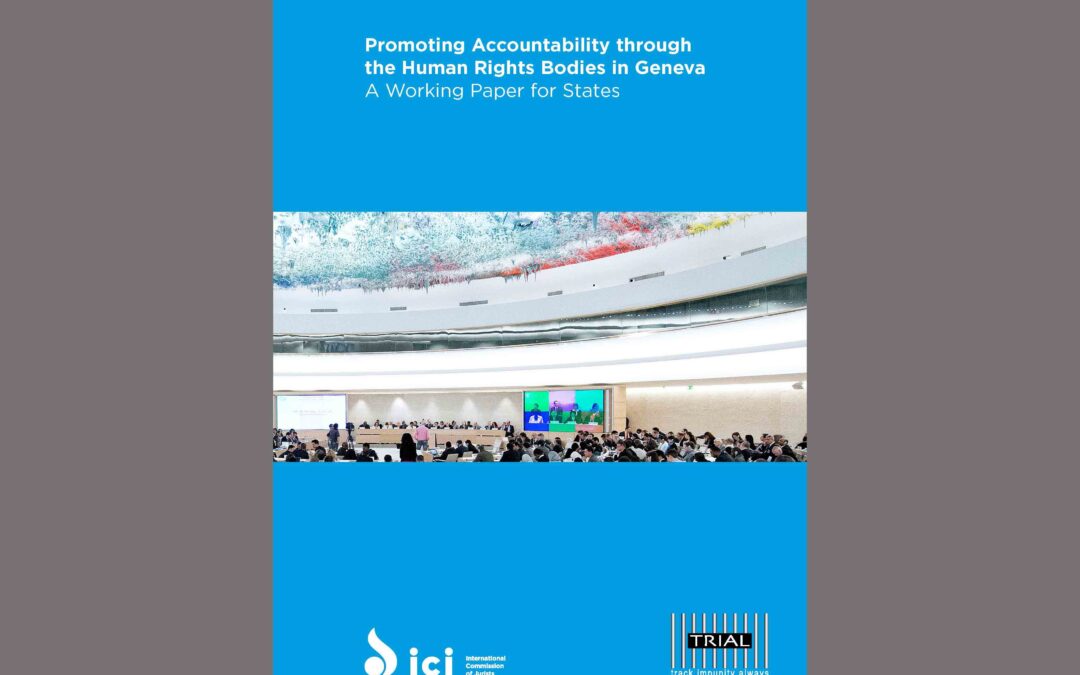
Sep 12, 2013 | News
Yesterday, during the 24th session of the UN Human Rights Council, the ICJ and TRIAL (Swiss Association against Impunity) jointly held a parallel event on promoting accountability through human rights mechanisms in Geneva.
The event was co-sponsored by the Permanent Missions of Switzerland, Estonia and Costa Rica to the United Nations Office at Geneva.
A corresponding report produced by ICJ and TRIAL was also launched at this event in two versions, one aimed at civil society and another aimed at States.
Panellists at this event included Ian Seiderman of the ICJ, Gabriella Citroni of TRIAL and Theo van Boven, former Special Rapporteur on torture and other cruel, inhuman or degrading treatment or punishment and ICJ Honorary Commissioner.
Mona Rishmawi of the Office of the High Commissioner for Human Rights (OHCHR) chaired the event.
The main topic of this event was the ICJ-TRIAL report, which reviews the legal framework for promoting accountability and suggests possible action by civil society and States to engage with the human rights mechanisms in Geneva to better promote and achieve accountability for human rights violations.
The role of national mechanisms, such as national human rights institutions, working in cooperation with the UN mechanisms was also highlighted.
The report focuses specifically on the Human Rights Council and its subsidiary bodies, such as the Universal Periodic Review and the special procedures mechanisms.
OHCHR’s role was further emphasised in regards to sharing best practices as well as ensuring follow-up to issues of accountability as they come to the attention to the UN.









